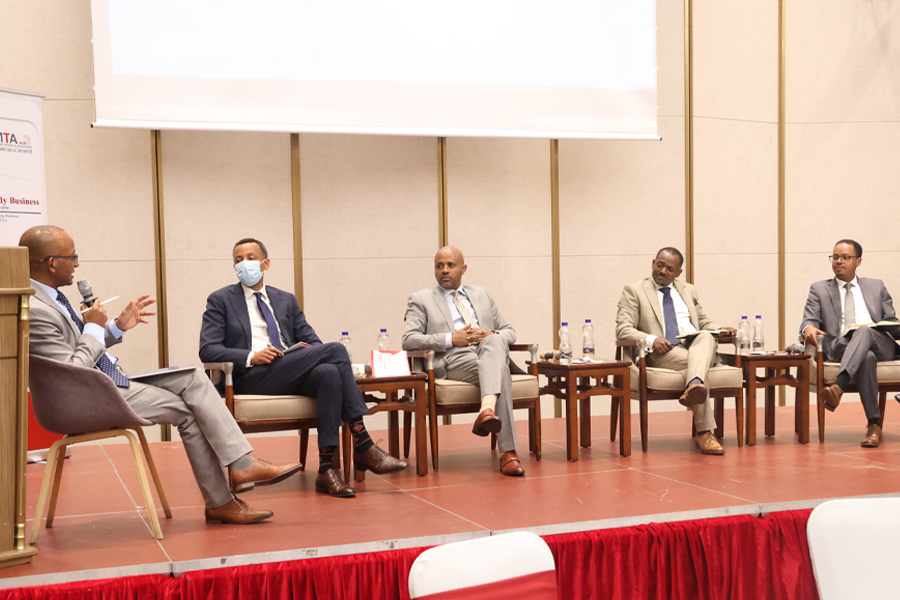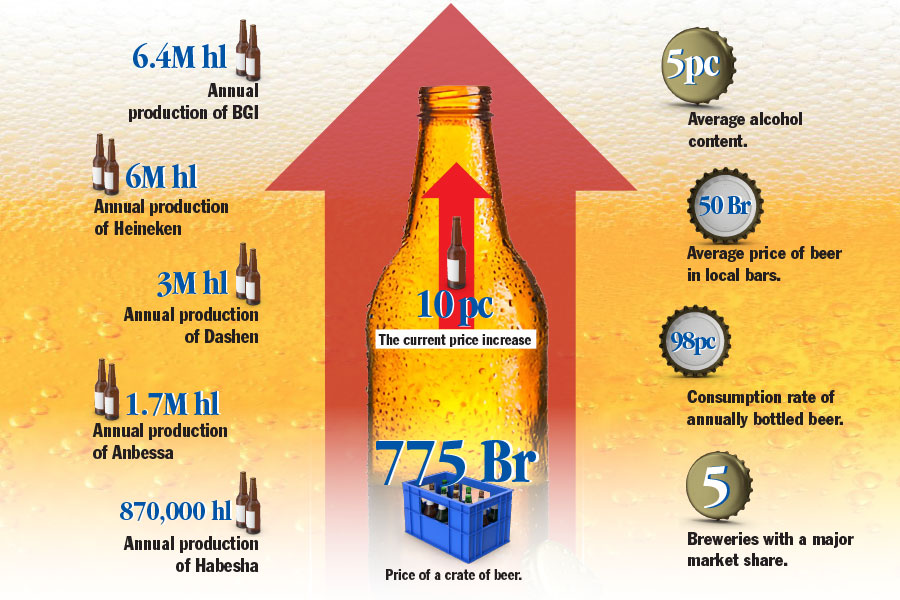
Radar | Oct 05,2024
The Ethiopian Bankers Association (EBA) has voiced strong objections to a draft regulation on Value Added Tax (VAT) under review by the Ministry of Finance. Its leaders argued that the proposal could impose undue burdens on the banking industry and create confusion over what financial services should remain exempt.
The Association's leadership sought clarification in a letter to the Finance Minister, Ahmed Shide. Its Secretary General, Demissew Kassa, stated the need for clear guidelines to ensure banks comply with the new VAT requirements without disrupting their operations. He noted that the banking industry's feedback came after extensive discussions with policymakers, during which the Ministry requested the Association provide detailed comments.
"We need clarity and answers," Demissew told Fortune, echoing the industry's concerns.
The draft regulation, a part of the federal government's broader effort to widen the tax base, has sparked concern within the banking community, particularly over categorising certain financial services as taxable, a departure from longstanding tax exemption rules. Under the proposed regulation, financial services provided by licensed banks or financial institutions remain generally exempt from VAT. However, the exact scope of these exemptions is unclear for industry operators, notably lacking a precise definition of what constitutes a "financial service."
Bankers warn that this ambiguity could lead to inconsistent tax applications and confusion among financial institutions, potentially disrupting services. The Association, chaired by Abie Sano, president of the state-owned Commercial Bank of Ethiopia (CBE), urged that this definition be broadened to include emerging market players, such as capital market service providers, who are expected to enter the financial landscape soon.
The draft regulation follows a proclamation passed by Parliament several months ago, which laid the groundwork for exempting certain financial services, including savings, loans, pension administration, and related services. However, it marks other financial activities as taxable, which has ignited debate. Transactions involving the foreclosure of a debtor's property are not exempt, a decision that has stirred controversy within the financial sector.
The Association leaders, representing 26 of the 30 banks, argue that foreclosure sales proceeds should be exempt. Bank executives claim that the process of recovering debt through property foreclosure is a financial service that should not be subject to VAT. They contend that these activities are standard practice for financial institutions dealing with defaulting debtors and that taxing them would complicate an already challenging process.
Worku Lemma, a senior banker, described the taxation of foreclosed properties as impractical, seeing them as sales methods for banks to recover sick loans. He warned that imposing VAT on these sales would inflate prices, deter potential buyers, and likely increase unsold properties.
"It doesn't make sense," said Worku, expressing scepticism about the rationale behind the proposal.
The banking industry is currently assessing the potential impact of the new tax, though some executives admit that the full implications remain uncertain. Wegagen Bank, among others, is analysing the possible consequences of the VAT law, though its senior executives acknowledge that it is still too early to determine its impact on the industry.
"It's too early to know the implications," an executive told Fortune.
His voice echoes the uncertainty prevailing in the banking industry.
A recent financial stability report from the National Bank of Ethiopia (NBE) unveiled several challenges the industry faced, adding context to the ongoing VAT debate. Non-performing loans (NPLs) in the commercial banking segment have risen to 3.9pc, driven by factors such as drought, conflicts, and a severe shortage of foreign currency. The report also revealed a high concentration of credit, with the top 10 borrowers accounting for nearly 23.5pc of the total 1.9 trillion Br in loans and advances, equivalent to 21.7pc of GDP. Only 0.5pc of borrowers with credit exposure exceeding 10 million Br hold nearly three-quarters of loans. Total deposits have reached 2.2 trillion Br, with a high loan-to-deposit ratio, though the ratio of loans and bonds to deposits has slightly dipped to 90.3pc.
The Association's letter to the Finance Ministry argued that the combined impact of VAT on financial services could undermine affordability and accessibility, potentially undermining efforts to include low-income individuals and small businesses in the formal financial system.
However, tax authorities have taken a different view. Officials at the Ministry of Finance argue that the sale of foreclosed properties is not a financial service but rather a trade activity involving property transactions. They assert that foreclosure sales share the attributes of conventional sales transactions and meet the taxable criteria of a "supply of goods or services," including prices at which the goods are foreclosed and sold.
The debate over the draft regulation is occurring as the federal government pursues broader tax reforms, aspiring to increase the tax-to-GDP ratio from a record low of 6.8pc last year. The ratio, which measures tax revenue as a percentage of GDP, experienced a peak of 13.2pc in 2011 after aggressive reform was pushed by Melaku Fenta, the then-chief of the federal tax authority.
The Finance Ministry, led by tax policy advisor Wasihun Abate, has been advocating for an expanded tax base as part of ongoing macroeconomic reforms. According to Wasihun, adhering to the two-decade-old proclamation, which fully exempted financial services to promote the sector's growth, is no longer viable in the current economic reality.
In a new program signed in July 2024, Ethiopian authorities have agreed with the International Monetary Fund (IMF) to increase the tax-to-GDP ratio by four percentage points by 2027/28 through comprehensive tax policy and administration reforms. Specific measures include introducing an excise stamp regime, overhauling the VAT systems, and implementing a new real estate tax regime. Unless reversed, the IMF warned that the ratio will further drop to 6.3pc in the 2023/24 fiscal year, a far cry compared to the average 15pc for sub-Sahara Africa.
Agreeing with the IMF, Ethiopia's leaders have committed to reverse the trend of declining tax revenues and improve fiscal sustainability through enhanced domestic revenue mobilisation. The value-added tax regime, first introduced 22 years ago, is one area of their primary focus, accounting for 24pc of the federal tax revenue target of 502 billion Br. However, VAT exemptions have applied to a range of goods and services, causing the federal government to forego revenues.
Ketema Adane, a tax expert and partner at Ethio-Alliance Advocates LLP, noted the longstanding debate over taxing services within financial institutions. He recalled a court dispute involving EthSwitch, which faced VAT charges after revenue authorities categorised its services as non-financial. Ketema argued that tax exemptions are intended to encourage investment and support lower-income segments of the population.
In 2002, officials from the then-Ministry of Revenue assured the banking industry that it would be shielded from such tax obligations, relieving banks of the duty to obtain tax clearance on properties held as security for loans. The proposed changes to VAT have drawn criticism from several industry groups, which have expressed concerns as the bill moves toward a vote under the Standing Committee for Plan, Budget & Financial Affairs. The new levies would expand the tax base to cover previously exempt services, including taxi-hailing, e-commerce, and utilities such as electricity, water, and telecom services.
Ketema anticipates that the current debate will likely depend on whether the sale of collateralised assets through bank foreclosure constitutes loan collection or property transactions. He doubts these activities fall under the investment category or benefit consumers.
"They'll likely be taxed," he told Fortune.
As Ethiopia seeks to triple its tax revenue through these reforms, Ketema recommended proper implementation mechanisms, including technology integration, to ensure efficiency and fairness. While the expansion is expected to increase revenues and the tax-to-GDP ratio, he warned that additional costs would likely be passed on to consumers, making goods and services less affordable.
"It's a win-lose scenario," said Ketema.
Suggesting that the federal government's push to expand the tax base may outweigh arguments for exemptions, he cautioned the mixed outcomes that the new VAT regulation could bring to Ethiopia's economy.
PUBLISHED ON
Sep 01,2024 [ VOL
25 , NO
1270]

Radar | Oct 05,2024

Fortune News | Apr 15,2023

In-Picture | Aug 30,2025

Fortune News | Jun 29,2025

Fortune News | Mar 04,2023

Radar | Jun 25,2022

Agenda | Sep 08,2024

Delicate Number | Oct 18,2025

Agenda | Sep 28,2024

Fortune News | Aug 05,2023

Dec 22 , 2024 . By TIZITA SHEWAFERAW
Charged with transforming colossal state-owned enterprises into modern and competitiv...

Aug 18 , 2024 . By AKSAH ITALO
Although predictable Yonas Zerihun's job in the ride-hailing service is not immune to...

Jul 28 , 2024 . By TIZITA SHEWAFERAW
Unhabitual, perhaps too many, Samuel Gebreyohannes, 38, used to occasionally enjoy a couple of beers at breakfast. However, he recently swit...

Jul 13 , 2024 . By AKSAH ITALO
Investors who rely on tractors, trucks, and field vehicles for commuting, transporting commodities, and f...

Oct 25 , 2025
The regulatory machinery is on overdrive. In only two years, no fewer than 35 new pro...

Oct 18 , 2025
The political establishment, notably the ruling party and its top brass, has become p...

Oct 11 , 2025
Ladislas Farago, a roving Associated Press (AP) correspondent, arrived in Ethiopia in...

Oct 4 , 2025
Eyob Tekalegn (PhD) had been in the Governor's chair for only weeks when, on Septembe...